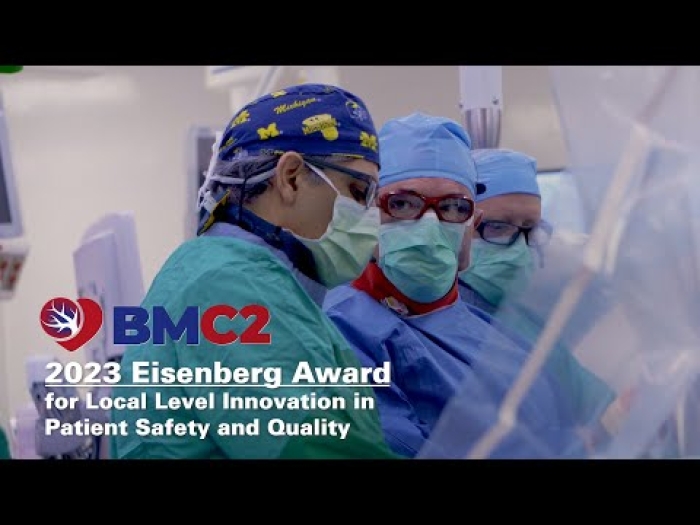
We are all so ready to be done with this pandemic. We social distanced all summer — and well into sweater weather. We canceled our graduations and weddings. We figured out the Zoom (and made memes about it). Many of us helped our kids go back to school … on the internet.
Even more distressing, some of our businesses closed, a lot of us lost our jobs, and many of us are now just trying to make ends meet. Most devastating of all, some of our friends, family members, neighbors, and acquaintances got sick and died.
Can we just be done with COVID-19 now? Adam Lauring, M.D., Ph.D., associate professor of infectious diseases and microbiology and immunology, may not be able to answer that question, but he has answered the rest of our most pressing COVID-19 questions. And he offers some hope for a future without this disease.
What do we know about COVID-19 now that we didn't in the beginning?
Everything. It's been pretty amazing. On the basic science side, we know so much about this virus: how it gets into cells, how it spreads in the body, how it affects different organs in the body. We've learned a lot about how it transmits and what measures can limit that: social distancing, masks, how to protect people in health care environments, how to protect health care workers, how to make use of PPE. We've learned how to treat the virus: We've got an anti-viral drug, and we've learned how to use other drugs to help people and how to do critical care on patients. We also have many vaccines in late stage trials. When you step back, that's pretty darn amazing, just from a medical science point of view.
What is still unknown?
Almost as much. I think we still have some things to learn about transmission, such as why some people appear to spread the virus more than others. There's a huge range. Some people infect no people; some people infect tons of people. It's not just because you're in a crowded environment without masks.
I still think we have a lot to learn about the basics of the virus, and I think there's a lot to learn about how it's causing these various symptoms in people. Why do some people get better but then still have "the long haul," not recovering quickly? I think there's a lot to learn about what it's doing beyond just causing a respiratory illness, and there's a lot to learn about the immunology and how that can inform vaccines. Even if we have a vaccine, how do we make it better? How do we protect long-term? When is it safe to go back to schools and things like that?
What about genetic mutations? Is the virus evolving in a way that it's becoming more dangerous?
There have been mutations seen in SARS-CoV-2 since it emerged, but there's not a lot in terms of what they mean, in terms of disease and vaccines and things like that. The mutations have been very helpful for understanding how transmission happens and how the virus is spreading around the U.S. and the world.
There's no evidence that the virus is becoming more dangerous. There's been a lot of press about it, particularly one mutation on the surface of the virus. No one has been able to show that it actually makes the virus more dangerous, less dangerous, more transmissible, or less transmissible. The jury's still out.
For now, it looks like the virus is still doing the harm it's going to do, but it doesn't appear to be becoming more dangerous. It's dangerous enough, and sometimes viruses will run a risk if they become too dangerous to their hosts. Then they can't spread, so that makes it worse for the virus.
Should we worry about COVID-19 reinfection?*
Just because something happens, doesn't mean it happens a lot. The big thing people look for are antibodies, which you can measure in someone's blood. We know from looking at people who've been infected with SARS-CoV-2 or who are in the vaccine trials, that people tend to make a good amount of antibodies against the spike protein, which the virus uses to infect a cell and is a major target for vaccines. Antibodies do decrease over time, but that doesn't mean you aren't protected.
What's so great about contact tracing?
Contact tracing is really important because it's what allows some return to normalcy. You can definitely limit the spread of the virus by shutting everything down and no one being in contact with anyone. That's a very effective way. But if you're not going do that, which we can't do indefinitely, the next best thing is to be able to find who's got the virus and who's potentially transmitting it to others.
Contact tracing is very low tech, and it's very person intensive. The keys to good contact tracing are being able to identify people quickly, having tests that come back quickly that are accurate, and enlisting the cooperation of people to be able to find who they've been in contact with. The challenges come if there's a delay. The longer it takes to find who's infected, the more people they're going contact, which means more people you have to find. It just cascades from there. That highlights the real challenges in doing it well. One thing that makes it easier is if everyone has fewer contacts. Cutting down on large gatherings and things like that pays a dividend in terms of contact tracing.
There's a lot of focus on the somewhat low death rate of COVID-19, leading some people to ask: is a vaccine really necessary?
The important thing to remember is that "low," most people say, is probably around 0.5%. So one out of 200 people. That's a lot of people. Whether you translate it to Washtenaw County, the state of Michigan, or the country, that's a lot of people who we care about.
The other thing to keep in mind is, by protecting the population, we are able to return more to what life was like before 2020. People can feel safe being outside and congregating, which is, as we're all seeing, quite important for our way of life.
There is also the benefit of making sure our health system isn't overrun. We all see what happens with the disease surges. The hospital gets overflowed, and there's this cascade effect, impacting people who need surgery and people who need medical attention for other things. That can't happen because the hospital is essentially shut down by one disease.
We vaccinate for a lot of diseases that don't kill 1% of the people, but the vaccines still provide benefits. As I said before, I consider losing 0.5-1% of people to be unacceptable, but COVID-19 also harms a lot of people without killing them. It's important to protect people from that."
If there's a vaccine, is it going to be like the flu, and we'll need to get a new one each year?
We don't have any sign yet that we're going to need to update the vaccine annually. We certainly know that the virus actually changes much more slowly than influenza and other viruses, so that's reassuring. What I always tell people is, flu is kind of the exception, not the rule. Most vaccines we're not updating every year; flu is almost the only one we do that sort of thing with. We've got plenty of other viruses where you make one vaccine, and it works, and you don't need to update it. We don't know with SARS-CoV-2, but the scoreboard, in terms of update vs. not update, is in favor of not having to update."
*This question (and answer) came from a Michigan Medicine Health Lab Blog article by Kelly Malcom. Click here to read more about reinfection.





